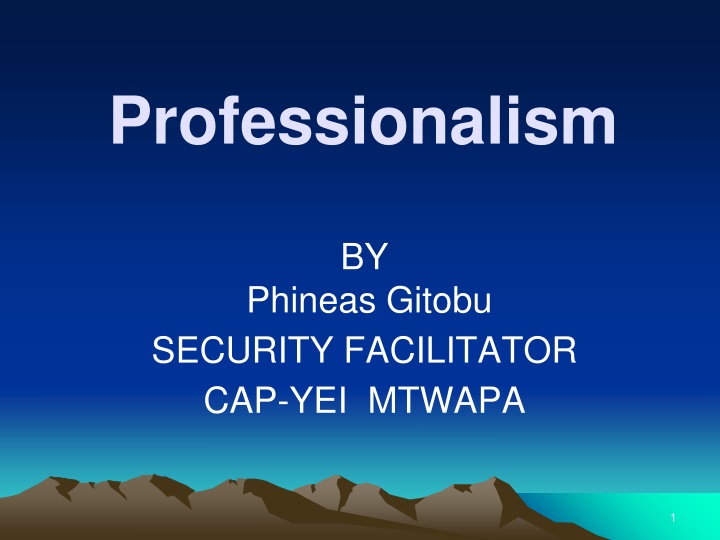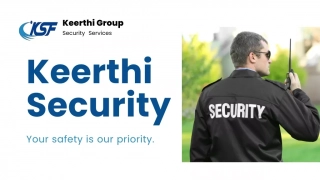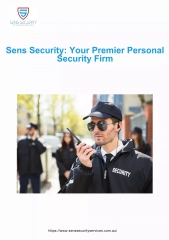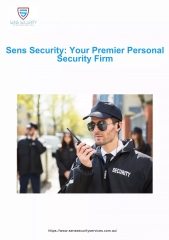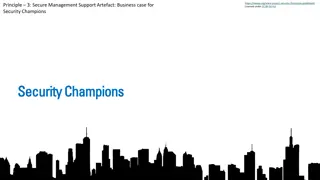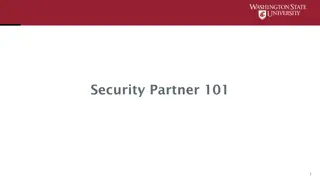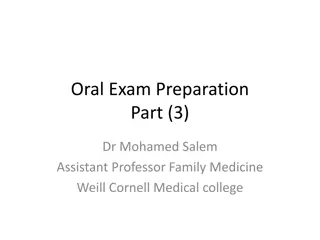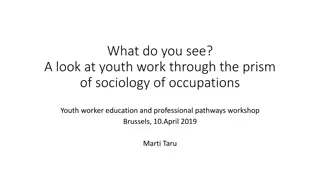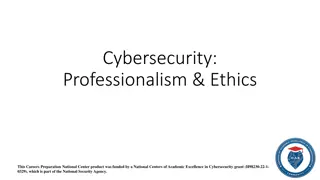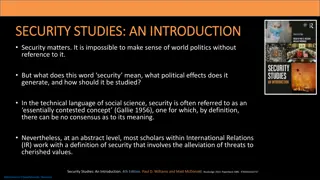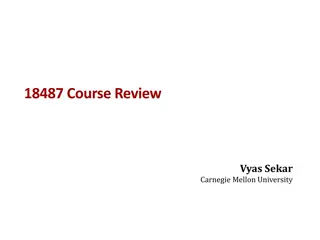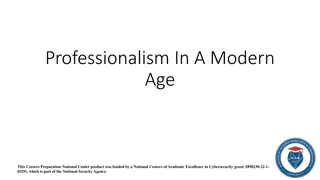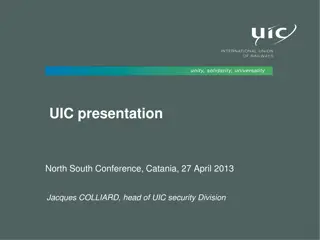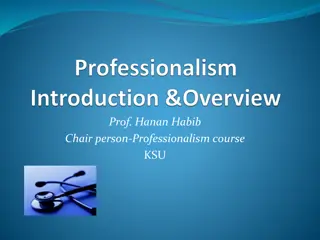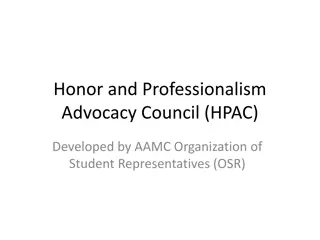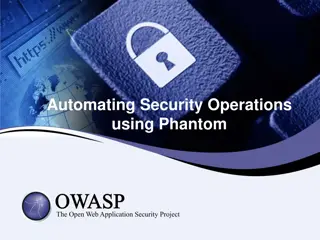The Importance of Professionalism in Security Services
Highlighting the significance of appearance, attitude, integrity, and reliability in maintaining professionalism for security guards. Emphasizes the impact of a professional demeanor on how guards are perceived and respected by others.
Download Presentation

Please find below an Image/Link to download the presentation.
The content on the website is provided AS IS for your information and personal use only. It may not be sold, licensed, or shared on other websites without obtaining consent from the author.If you encounter any issues during the download, it is possible that the publisher has removed the file from their server.
You are allowed to download the files provided on this website for personal or commercial use, subject to the condition that they are used lawfully. All files are the property of their respective owners.
The content on the website is provided AS IS for your information and personal use only. It may not be sold, licensed, or shared on other websites without obtaining consent from the author.
E N D
Presentation Transcript
Professionalism BY Phineas Gitobu SECURITY FACILITATOR CAP-YEI MTWAPA 1
Appearance Usually the first thing people notice about you is how you look. If you look professional people will be more likely to treat you with respect. Things to remember about appearance Guards who do not dress properly for their role, or who are dirty or sloppy, will not be seen to be professional. Guards with strong body odour, bad breath, or smelly clothes may be repulsive and not respected. 2
You will give a professional appearance if you shower or bath daily. brush your teeth regularly. keep your hair well-groomed and clean have clean, trimmed nails. wear the proper uniform for your job. make sure your uniform is clean and pressed. make sure your shoes or boots are clean, shined, and in good condition. look after your equipment. 3
Professional guards have Good posture sit and stand straight walk with purpose and give appearance of being both relaxed and alert They are at ease, but ready to react 4
Attitude and Conduct Guards with a positive work attitude They take pride in themselves and what they do try to improve themselves. keep up with changes in the industry. use what they learned in training, while they are on job. help other employees. have energy and drive. try to find better ways to do their job and to make the workplace safer for everyone come up with new ideas to improve the image of their company and the security industry and share them with their employer. 5
What is integrity? It is an inner guideline that tells the person how to react positively to the outside world. People who have integrity are respectful, reliable, honest and principled. Professional guards have integrity and discipline. They also communicate well with all sorts of people. When you are respectful you like yourself and treat yourself well. you treat others as you treat yourself. you understand that it is important to follow laws and orders. you respect the property of others. 6
When you are reliable you can be depended on to do your duties to the best of your ability. you can take control and stay calm in emergencies. you are on time. You arrive and leave in time to share information with guards on other shifts. 7
When you are honest you tell the truth. you take responsibility for your actions, instead of blaming others. you can be trusted to keep information to yourself. you are sincere. This means that the person that you show to others is the same as who you are inside. 8
When you are principled you believe in treating everyone fairly. you speak out if you see someone being treated unfairly. Is discipline like self-control? Self-control is certainly a big part of discipline. 9
If you are disciplined, you show strong self-control, even when challenged. remain calm under stress. follow procedures with little or no supervision. are well-organized and carry out your duties with care. do not become involved in any gossip in your workplace, no matter how hard people try to get you involved or how you feel about it. enforce the rules and procedures at your site no matter who is involved, from the entry level employee to the MD. 10
interacting with the public? DO 1. 2. DONT 1. Use a polite, calm approach Be friendly smile and make eye contact Be businesslike and confident Be open-minded Explain Be courteous at all times Use please and thank you Mr. Ms Sir Ma am Show that you are not looking for trouble, but you are in control Show a sincere desire to help Show signs of impatience, anger, dislike, sarcasm Become too familiar, casual Be cold or bossy Be closed-minded judgmental Get trapped into fighting over an issue beyond your control Lose your temper with difficult people Use insults or swear words Appear to be a threat Ignore or dismiss people. 2. 3. 4. 5. 3. 4. 5. 6. 7. 6. 7. 8. 9. 8. 9. 11
Effective Communication Effective communication is communication that works. This happens when people clearly understand each other. Active listening Give the person silence. Don t interrupt. Don t make judgments. Reflect the person s feelings. Paraphrase. 12
Way of speaking Use a respectful, encouraging tone of voice. Speak with expression, rather than one tone. Speak loudly enough for people to clearly hear you. Don t yell unless you re trying to warn people of immediate danger. Adjust your rate of speech to fit the situation. Try to use plain language that is used in everyday conversation so most people can understand you. 13
Body language Start a conversation with a smile. Keep a comfortable distance between you and the other person. Stand in a supportive way. Keep eye contact at the level that the other person is comfortable with. Keep focused on the person. Avoid distracting movements or gestures, Be aware of the other person s body language. It can help you to understand how they feel. 14
interviewing witnesses & other people? Find a quiet spot where you will not be bothered Face the person squarely and at their level. Keep focused on the person s words If the person starts talking about something else, gently bring them back to talking about the incident. Remind them that you need to get the facts. Take detailed notes. Get contact information, if possible Keep all information that you get confidential. Don t make promises that you cannot keep. Respect a person s rights. 15
Interview questions An important part of interviewing someone is to know what kinds of questions to ask and when to ask them. open-ended questions closed-ended questions Open-ended questions invite the speaker to tell a story i.e. 1. Can you tell me what happened? 2. What did you see? 3. How did that make you feel? 4. What did you do next? 16
CONTI.. Closed-ended questions are used when you want specific information They are usually answered with yes or no or short answers. i.e. 1. Were there any other witnesses? 2. What time did this happen? 3. Where were you standing? Avoid leading questions that actually state your opinion. E.g. 1. Why would you do something like that? 2. Don t you think you should have walked away? Ask one question at a time. Give the person time to answer before asking the next question. 17
Crowd Control A crowd is a large number of people grouped closely together Types of crowds Acquisitive crowd Expressive crowd Spectator crowd Sightseer crowd Escape crowd Hostile crowd 18
Dealing with hostile crowds? Never try to deal with a potentially hostile crowd on your own. Always call for back-up Here are some ways well-trained people, such as police, may begin to break up a hostile crowd if you feel that the crowd is about to become dangerous. Break the crowd into smaller groups Switch the crowd s attention Remove the leaders Use a positive role model 19
Labour Disputes A labour dispute is a disagreement between employees and employers Strikes and lockouts are legal actions that may take place if this agreement breaks down. A strike is when employees agree to stop working A lockout is when the employer stops employees who belong to the union from entering the work site. 20
What can I do to keep things under control? keep yourself in control Your job will be to remain neutral and to follow correct procedures. Do not discuss details or offer your opinion Report all incidents and problems to your employer even if you can deal with them on your own. Record all incidences in case the courts or police become involved. Try to establish some communication with the picket captain. If challenged you, remind yourself not to take it personally 21
CONTI. Avoid unnecessary conversation, and do not apologize for doing your job. Keep a neutral expression on your face and carry on with your duties. If it turns violent, leave, call the police, observe from a safe distance, and report what happens. 22
How do I deal with the media? Refer the media to a site manager or your employer. Do not make any statements or give your personal views, even if they tell you it is off the record. Do not fall back on the no comment answer, as that can be used against you. 23
